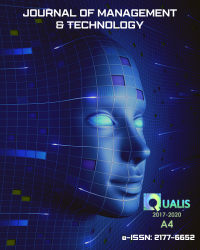Avaliação de oportunidades e perspectivas para o desenvolvimento do sistema de educação a distância nas condições dos desafios modernos
DOI:
https://doi.org/10.20397/2177-6652/2024.v24i5.3118Resumo
Objetivo: Avaliar as oportunidades e perspectivas para o desenvolvimento do sistema de educação a distância nas condições dos desafios modernos, com foco na implementação de tecnologias inovadoras e informativas.
Método: Utiliza-se uma abordagem metodológica inovadora para o desenvolvimento de sistemas de educação a distância, incluindo modelagem econômica e matemática e a aplicação de tecnologias educacionais avançadas.
Resultados: Os resultados mostram melhorias nos mecanismos de gestão de sistemas inovadores de educação a distância e o desenvolvimento de métodos inovadores para a avaliação socioeconômica da eficácia da educação a distância.
Conclusão: Conclui-se que é possível aumentar a eficiência da educação a distância mediante a implementação de estruturas inovadoras e a gestão qualitativa baseada em avaliações socioeconômicas, contribuindo para uma maior competitividade dos serviços educacionais.
Referências
Casas, J.P. (2020). Educating the Digital Generation: Exploring the Role of Teacher Education to Prepare for Digital Learners. Journal of Teacher Education and Professional Development, 3(1), 25-39.
Gardner, H. (2013). The App Generation: How Today's Youth Navigate Identity, Intimacy, and Imagination in a Digital World. Yale University Press.
Prensky, M. (2001). Digital Natives, Digital Immigrants. On the Horizon, 9(5), 1-6.
Prensky, M. (2010). Teaching Digital Natives: Partnering for Real Learning. Corwin Press.
Iasechko, S., Pereiaslavska, S., Smahina, O., Lupei, N., Mamchur, L., & Tkachova, O. (2022). Artificial Intelligence in the Modern Educational Space: Problems and Prospects. IJCSNS International Journal of Computer Science and Network Security, 22(6), 25-32.
Tsilmak, O., Iasechko, S., Poplavska, M., Motlyakh, O., & Kabanets, O. (2022). Modern Innovative Forms of Teaching Law at Other Schools in Ukraine. Revista Eduweb, 16(4), 166-177.
Tapscott, D. (1998). Growing Up Digital: The Rise of the Net Generation. McGraw-Hill.
Turkle, S. (2011). Alone Together: Why We Expect More from Technology and Less from Each Other. Basic Books.
Mills, K. A. (2016). Literacy Theories for the Digital Age: Social, Critical, Multimodal, Spatial, Material and Sensory Lenses. Multilingual Matters.
Thomas, D., & Brown, J.S. (2011). A New Culture of Learning: Cultivating the Imagination for a World of Constant Change. CreateSpace Independent Publishing Platform.
Warschauer, M. (2004). Technology and Social Inclusion: Rethinking the Digital Divide. MIT Press.
Lankshear, C., & Knobel, M. (2008). Digital Literacies: Concepts, Policies and Practices. Peter Lang Publishing.
Jenkins, H., et al. (2009). Confronting the Challenges of Participatory Culture: Media Education for the 21st Century. MIT Press.
Alkali, Y. E., & Amichai-Hamburger, Y. (2004). Experiments in Digital Literacy. CyberPsychology & Behavior, 7(4), 421–429.
Bawden, D. (2001). Information and digital literacies: A review of concepts. Journal of Documentation, 57(2), 218–259.
Bawden, D. (2008). Origins and concepts of digital literacy. In C. Lankshear & M. Knobel (Eds.), Digital literacies: Concepts, policies and practices (pp. 17–32). Peter Lang Inc.
Espinosa, E. O. C., Ruiz, J. A. C., & Mercado, M. T. C. (2021). The Training of the Digital Competence at the Postgraduate Level for a Knowledge-Based Economy. In IT and the Development of Digital Skills and Competences in Education (pp. 82–99).
Esteve-Mon, F., Cela-Ranilla, J. M., & Gisbert-Cervera, M. (2016). ETeach3D: Designing a 3D virtual environment for evaluating the digital competence of preservice teachers. Journal of Educational Computing Research, 54(6), 816–839.
Eshet-Alkalai, Y., & Amichai-Hamburger, Y. (2004). Experiments in digital literacy. Cyberpsychology and Behavior, 7, 421–429.
Giger, P. (2006). Participation Literacy Part I: Constructing the Web 2.0 Concept. Karlskrona: Blekinge Institute of Technology.
Gruszczyńska, A., Merchant, G., & Pountney, R. (2013). Digital Futures in Teacher Education: Exploring Open Approaches towards Digital Literacy. The Electronic Journal of e-Learning, 11(3), 193–206.
Isto, H. (2012). Information Services and Digital Literacy: In Search of the Boundaries of Knowing. Oxford: Chandos Information Professional Series.
Keskin, I., & Yazar, T. (2015). Examining digital competence of teachers within the context of lifelong learning based on twenty-first century skills. Journal of Human Sciences, 12(2), 1691–1711.
European Commission. (2019). Key competencies for lifelong learning. DOI: 10.2766/569540
Lau, J. (2006). The impact of information competencies on socio-economic development in Southern Hemisphere economies. In A. Martin & D. Madigan (Eds.), Digital literacies for learning (pp. 152–161). London: Facet.
Lisborg, S., Händel, V. D., Schrøder, V., & Rehder, M. M. (2021). Digital competencies in Nordic teacher education: An expanding agenda. Nordic Journal of Comparative and International Education (NJCIE), 5(4), 53–69.
Markauskaite, L., Carvalho, L., & Fawns, T. (2023). The role of teachers in a sustainable university: From digital competencies to postdigital capabilities. Educational Technology Research and Development, 71, 181–198.
Downloads
Publicado
Como Citar
Edição
Seção
Licença
Copyright (c) 2024 Revista Gestão & Tecnologia

Este trabalho está licenciado sob uma licença Creative Commons Attribution-NonCommercial 4.0 International License.
Os direitos, inclusive os de tradução, são reservados. É permitido citar parte de artigos sem autorização prévia desde que seja identificada a fonte. A reprodução total de artigos é proibida. Em caso de dúvidas, consulte o Editor.


